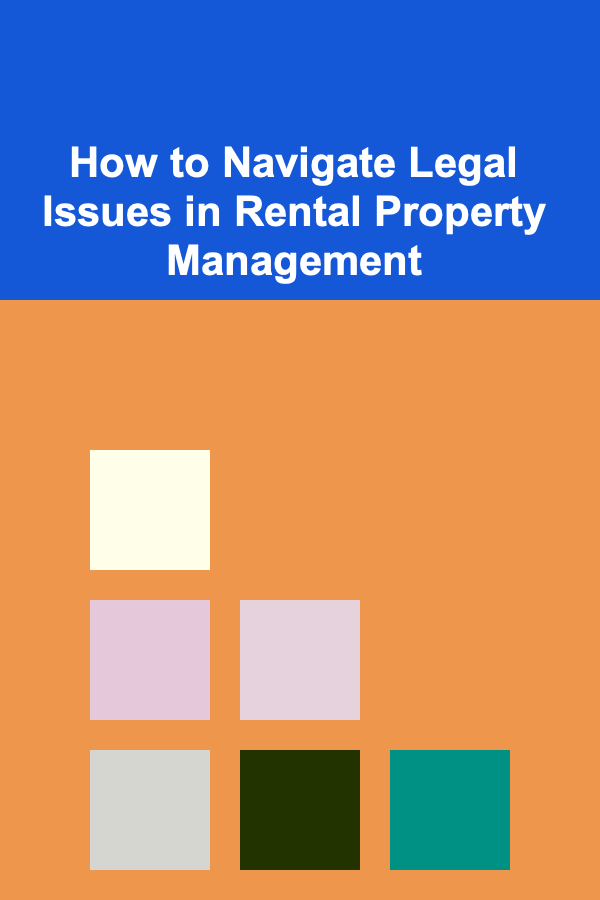
How to Navigate Legal Issues in Rental Property Management
ebook include PDF & Audio bundle (Micro Guide)
$12.99$7.99
Limited Time Offer! Order within the next:

Rental property management is a multifaceted business that requires knowledge not only of the physical upkeep and management of properties but also a deep understanding of the legal landscape. Navigating legal issues in rental property management can be a daunting task, but it's crucial for landlords to stay informed about the relevant laws and regulations in order to avoid costly disputes, fines, and lawsuits.
This article will provide a comprehensive overview of how to navigate legal issues in rental property management, covering topics such as lease agreements, tenant rights, eviction laws, discrimination, and maintenance obligations. By understanding these areas, landlords and property managers can effectively manage their properties while minimizing legal risks.
Understanding Lease Agreements
A lease agreement is the cornerstone of the relationship between the landlord and tenant. It outlines the terms and conditions of the tenancy, protecting both parties by clarifying their rights and responsibilities. A well-drafted lease agreement can prevent many legal issues from arising during the tenancy.
1.1 The Importance of a Clear Lease
A lease agreement should be comprehensive and clear, covering all aspects of the tenancy. Common issues that can lead to legal disputes include:
- Rent Amount and Payment Terms: Specify the monthly rent, the date it is due, acceptable payment methods, and the consequences for late payments.
- Security Deposit: Clearly outline the amount, conditions for its return, and any deductions that may be made at the end of the tenancy.
- Length of Tenancy: Specify whether the lease is for a fixed term (e.g., 12 months) or on a month-to-month basis. This will affect the notice required for termination.
- Property Use and Restrictions: Include clauses on the permitted use of the property (e.g., residential only) and any restrictions such as no pets, no smoking, or no subletting.
A lease agreement should also comply with local laws, such as rent control regulations and tenant protections. If you fail to follow these regulations, it could result in fines, penalties, or invalidation of specific clauses in the lease.
1.2 Disclosures Required by Law
In addition to the typical terms, landlords are often required to make certain disclosures in the lease agreement to comply with local, state, and federal laws. These disclosures may include:
- Lead Paint Disclosure: In properties built before 1978, landlords must provide a lead paint disclosure to tenants, notifying them of the potential risks of lead exposure.
- Mold and Health Hazards: Depending on local regulations, landlords may need to disclose any known mold or health hazards in the property.
- Notice of Security Deposit Use: In some states, landlords must detail how security deposits will be used and any interest that may accrue.
Failure to make the necessary disclosures can result in legal liabilities for the landlord.
Tenant Rights and Protection Laws
Understanding tenant rights is essential to maintaining a smooth and legally compliant rental operation. There are various laws and protections in place to ensure tenants are treated fairly.
2.1 Fair Housing Act
The Fair Housing Act (FHA) is a federal law that prohibits discrimination in housing based on race, color, national origin, religion, sex, familial status, or disability. Landlords must be careful not to discriminate when selecting tenants or making decisions about rental terms.
-
Discriminatory Practices to Avoid:
- Refusing to rent to someone based on their race, gender, or other protected characteristics.
- Steering tenants to certain neighborhoods based on their race, religion, or nationality.
- Imposing different terms or conditions based on a tenant's disability status.
-
Reasonable Accommodation: Under the FHA, landlords are required to make reasonable accommodations for tenants with disabilities. This could include allowing service animals in properties that otherwise have a no-pet policy.
Landlords must also ensure that advertisements and interviews are free from discriminatory language or actions. Using wording such as "ideal for young professionals" or "only for families" can lead to claims of discrimination.
2.2 Rent Control and Stabilization Laws
In some jurisdictions, local governments impose rent control or rent stabilization laws to limit the amount by which landlords can increase rent or to regulate the conditions under which rent can be raised. These laws are typically found in cities with high demand for rental housing, such as New York City and San Francisco.
- Rent Increase Restrictions: Rent control laws usually limit how much and how often rent can be increased. For example, in some cities, a rent increase may only be permitted once every 12 months and can't exceed a certain percentage of the current rent.
- Eviction Protection: Rent control laws may provide additional protections for tenants against eviction. For example, landlords may not be able to evict a tenant simply because they can no longer afford the rent increase.
Landlords operating in rent-controlled areas must be vigilant about these restrictions and ensure they are following the appropriate rules.
2.3 Tenant Privacy Rights
Tenants have the right to privacy in their rental units. As a landlord, you must respect their privacy while also having the ability to inspect or access the property when necessary.
- Notice of Entry: In most states, landlords must provide advance notice (typically 24 to 48 hours) before entering a tenant's rental unit, except in emergency situations. Common reasons for entry include repairs, inspections, or to show the property to prospective tenants.
- Search and Seizure: Landlords cannot conduct unreasonable searches of a tenant's belongings or living space without permission. If a tenant is suspected of illegal activity, the landlord may need to obtain a court order before entering the unit.
Eviction Laws
Eviction is a legal process through which a landlord can remove a tenant from a rental property. However, eviction laws are highly regulated and vary by jurisdiction. A wrongful eviction can lead to costly legal consequences, so landlords must understand the procedures and reasons that can justify an eviction.
3.1 Grounds for Eviction
Landlords can typically evict tenants for several reasons, including:
- Non-payment of Rent: Failure to pay rent on time is one of the most common reasons for eviction. However, landlords must follow the legal process for notifying tenants and allowing them time to pay or vacate.
- Lease Violations: If a tenant breaches the terms of the lease, such as having unauthorized pets or subletting the property without permission, the landlord may have grounds for eviction.
- Property Damage: If a tenant causes significant damage to the property beyond normal wear and tear, eviction may be justified.
- End of Lease: In some cases, a tenant may be evicted simply because the lease has ended and the tenant refuses to vacate the property.
3.2 The Eviction Process
The eviction process typically involves the following steps:
- Notice of Eviction: The landlord must provide a written notice to the tenant, detailing the reason for eviction and giving the tenant a certain period of time (usually 3 to 30 days) to rectify the issue or vacate the property.
- Court Filing: If the tenant does not comply with the eviction notice, the landlord must file a formal eviction lawsuit (also known as an unlawful detainer action) with the court.
- Court Hearing and Judgment: A court will schedule a hearing where both the landlord and tenant can present their case. If the landlord is successful, the court will issue an eviction order.
- Enforcement: If the tenant does not leave voluntarily, the landlord can request law enforcement assistance to remove the tenant.
Landlords must be cautious to follow the legal procedures and avoid "self-help" evictions, such as changing the locks or removing the tenant's property. These actions are generally illegal and can result in lawsuits.
Maintenance and Habitability Laws
Landlords are legally required to maintain rental properties in a habitable condition. Habitability laws vary by jurisdiction, but they generally ensure that tenants live in safe, sanitary, and livable conditions.
4.1 Implied Warranty of Habitability
In most places, there is an implied warranty of habitability, which requires landlords to ensure the property is safe and livable. This includes:
- Safe Plumbing and Heating Systems: Landlords must ensure that plumbing and heating systems are functional and meet health and safety standards.
- Structural Integrity: Landlords are responsible for maintaining the structural integrity of the building, including the roof, foundation, and exterior walls.
- Pest Control: If a tenant reports an infestation of pests such as rodents or insects, landlords are typically required to address the issue promptly.
Failure to address habitability concerns can lead to legal action from the tenant, including rent withholding, demands for repairs, or even lawsuits for damages.
4.2 Repair and Maintenance Responsibilities
While the landlord is responsible for maintaining the structure of the property and ensuring the safety of the tenants, tenants are typically responsible for routine maintenance and minor repairs. Common tenant responsibilities include:
- Keeping the property clean
- Changing light bulbs and air filters
- Notifying the landlord about issues that need attention
However, the specific responsibilities of both parties should be outlined in the lease agreement to avoid disputes.
Conclusion
Navigating legal issues in rental property management requires a thorough understanding of tenant rights, lease agreements, eviction laws, and property maintenance obligations. By staying informed about the legal landscape and ensuring compliance with local, state, and federal regulations, landlords can reduce their exposure to legal risks and foster positive relationships with tenants.
Legal issues can be complex, but with careful planning, proper documentation, and a commitment to fair practices, landlords can avoid many common pitfalls and create a successful rental business. Regularly reviewing lease agreements, staying up-to-date with changes in landlord-tenant law, and consulting with legal professionals when needed are key to protecting both the property and the business interests of rental property owners.

DIY Car Wash and Detailing: Tips and Tricks for a Showroom Shine at Home
Read More
How to Create a Smart School Supply Station for Kids
Read More
How to Design a User-Friendly Interface for Your Mobile App
Read More
How to Make Your Home Renovation Kid-Friendly and Safe
Read More
How to Use Under-Bed Storage to Save Space in Your Bedroom
Read More
Mastering the Art of Coupon Codes: Boost Your Savings with These Simple Tricks
Read MoreOther Products

DIY Car Wash and Detailing: Tips and Tricks for a Showroom Shine at Home
Read More
How to Create a Smart School Supply Station for Kids
Read More
How to Design a User-Friendly Interface for Your Mobile App
Read More
How to Make Your Home Renovation Kid-Friendly and Safe
Read More
How to Use Under-Bed Storage to Save Space in Your Bedroom
Read More